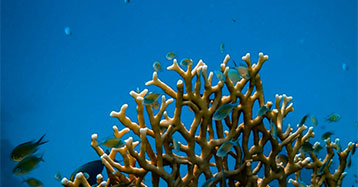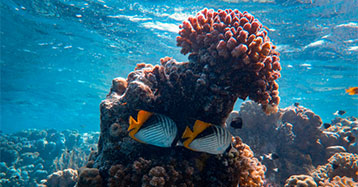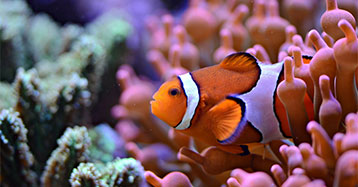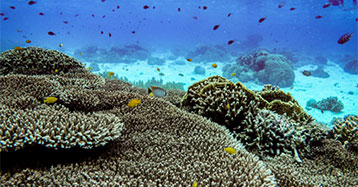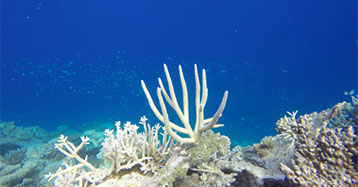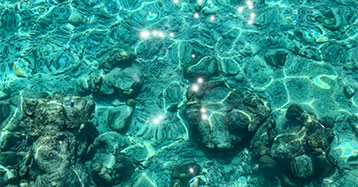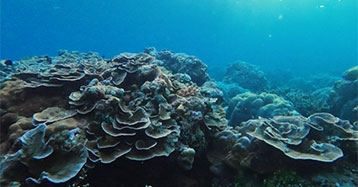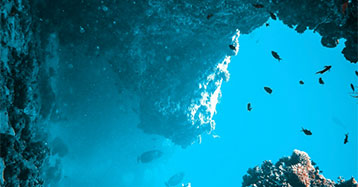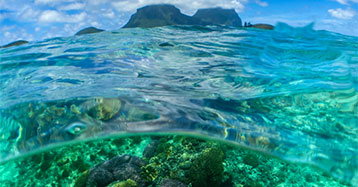Shallow Water Corals
Coral reefs are living, three-dimensional, underwater structures that provide habitat to algae, fish, crustaceans, and other organisms. Reefs provide ecosystem services—or benefits to humans—including food and shoreline protection while supporting fishing and tourism economies. Unfortunately, coral reefs face myriad threats, including increased water temperatures, excess nutrients, pollution, sedimentation, acidification, and overfishing. To help conserve coral reefs and support coral reef managers in their decision making, NCCOS conducts science and delivers products on coral reef ecosystems, including research, restoration science, mapping, and monitoring and assessment. NCCOS is a major contributor to NOAA’s Coral Reef Conservation Program’s portfolio.
Coral Research
NCCOS delivers evidence-based science products and tools to enable effective management of coral reefs based on coral research focused on understanding the interrelationships among living organisms, physical features, biogeochemical processes, natural phenomena, and human activities. Examples of our research include understanding and mitigating the causes of declining reef health, tracking and stopping the spread of deadly coral diseases, and understanding ecological connectivity and how reefs, their resident organisms, and surrounding habitats are connected. NCCOS, in partnership with NOAA’s Coral Reef Conservation Program, manages the Coral Disease and Health Consortium, a network of scientists and managers to develop improved measures of coral ecosystem health and provide managers with early warning of disease outbreaks and viable risk management options.
Coral Restoration Science
NCCOS works closely with the NOAA Office of Habitat Conservation’s Restoration Center and National Marine Sanctuaries, and U.S. states and territories to inform coral restoration design, implementation, and planning, and to evaluate restoration success. Our activities include developing models to evaluate reef resilience and forecast restoration-related changes in wave energy and inundation, building habitat maps to identify sites for restoration, using photogrammetry to acquire and analyze large area imaging, and artificial intelligence/machine learning.
Coral Mapping
Since 1999, NCCOS has been mapping coral reef ecosystems to support U.S. states and territories in their resource management and regulatory responsibilities, as well as to facilitate infrastructure siting, damage assessment, and effective monitoring designs. Our mapping and associated products utilize a variety of remote sensing tools, including satellite imagery, acoustic multibeam, fish acoustic sensors, oceanographic sensors, airborne lidar (light detection and ranging), uncrewed and airborne autonomous systems, divers, and remotely operated vehicles to map and characterize coral reef habitats and fish distribution patterns. Data from these tools is then combined with information on water depths between 0–30 m, topography, and seafloor composition to produce geospatial benthic habitat maps.
Coral Monitoring and Assessment
Monitoring coral reef ecosystems provides critical information on the health of the ecosystem, and serves as “a canary in the coal mine” to help gauge overall ocean health. In partnership with U.S. territorial and state governments, NOAA and other federal agencies, academia, and non-governmental organizations, NCCOS has worked since 2000 to monitor coral reefs and provide in-depth ecological assessments. Techniques used in projects range from quantifying the presence and impacts of chemical contaminants and other stressors, to producing habitat maps and in-water fish and habitat surveys. Highlights of our activities include estimating the flood protection benefits of coral reefs in Florida, and providing contaminant data to inform the listing of a new Environmental Protection Agency Superfund site in Puerto Rico.
NCCOS also plays a central role in both planning and executing NOAA’s National Coral Reef Monitoring Program under the NOAA Coral Reef Conservation Program. This program is a strategic framework for conducting sustained observations of biological, climatic, and socioeconomic indicators in U.S. states and territories. The resulting data provide a robust picture of the condition of U.S. coral reef ecosystems and the communities connected to them.
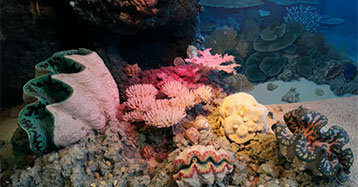
National Coral Reef Monitoring Program Implementation: Biological and Socioeconomic Monitoring
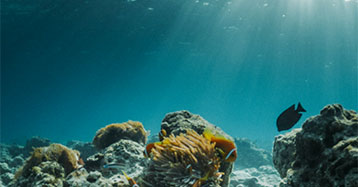
Assessing Land Based Sources of Pollution in Tinian, Commonwealth of Northern Mariana Islands
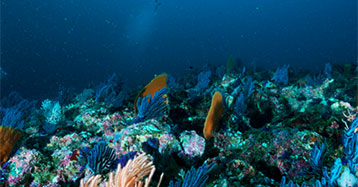
Mapping Ecological Priorities and Human Impacts to Support Land-Sea Management of Puerto Rico’s Northeast Marine Corridor

